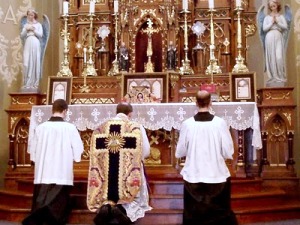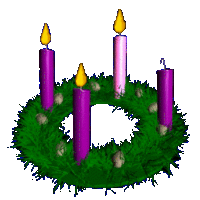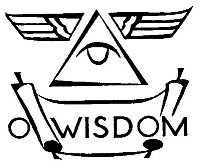 From a reader:
From a reader:
I recently went to FOCUS student leadership summit and Curtis Martin, the founder, told the story behind the Leo XIII’s prayer to St. Michael. Well the students at the summit loved the prayer, and spontaneously started praying it at the end of Mass! And my friends came home wanting to pray it after Mass. I know the Leonine Prayers have been suppressed, but can we get a dispensation from a Bishop or something like that to say them after Low (I suppose referred to as weekday in the OF) Mass?
Keep in mind that “after Mass” is after Mass! You can have any devotions you want to have after Mass.
Since “after Mass” is outside of Mass, people are free to pray as it pleases them. If Father, after Mass is ended, that is – outside of Mass – happens to kneel down and say a few super Catholic prayers, such as a few “Hail, Mary”s, the Salve Regina, etc., and people just happen to join in, what harm is there in that? Isn’t it good that people pray in church after Mass, rather than scramble for the door or yak it up?
People can stay and pray them with Father. People can leave if they have to or want to. What’s the big deal?
It is true that the so-called “Leonine Prayers” are not obligatory. I don’t think they are obligatory even after Low Mass in the Extraordinary Form (watch below for the “But Father! But Father! You’re wrong!” crowd to chime in). Nevertheless, I also think we need these prayers today.
The Leonine Prayers were eventually associated with the conversion of Russia, but they were originally developed, over time and in stages, to help combat secular oppression of the Church.
I don’t see that Russia is doing all that well these days and certainly there is no lack of attacks on the Church.
In the USA, I would like to see the American Bishops promote the Leonine Prayers during this time when true marriage is under attack, the Obama Administration is going to try to force Catholics to violate their consciences, and secularists and their liberal catholic bed-partners are suppressing a faithful Catholic voice in the public square.
Think about it:
O God, our refuge and our strength, look down with mercy upon the people who cry to Thee; and by the intercession of the glorious and immaculate Virgin Mary, Mother of God, of Saint Joseph her spouse, of the blessed Apostles Peter and Paul, and of all the saints, in Thy mercy and goodness hear our prayers for the conversion of sinners, and for the liberty and exaltation of Holy Mother Church.
There are some variations of translations, but … I ask you: Is that not a great and appropriate prayer for the challenges we are facing right now?
So, let’s pray the Leonine Prayers, on our own, if we have too. And I also suggest adding to them, as I do after every Mass, a Memorare for our bishops. I have a short list of bishops I pray for after every Mass, though you could offer it for all our bishops.
































My family kneels to pray the St. Michael prayer right after father processes out. Usually, it is like a flock of magpies in a recently harvested cornfield in the church, but we do it anyway.
In these uncertain times – of all times – we need the great Archangel Michael praying for and defending us.
He is my patron, too. :)
MSM
My pastor says them after the weekday Masses and I think it is wonderful. If ever there was a time when we need to be saying the Prayer to St.Michael and, as you say,” a few “Hail, Mary”s, the Salve Regina, etc.”, now is the time
Most people stay and join in, some leave..and that is fine.
Exactly.
In some parishes, including one I attend sometimes, the people say the prayer to St Michael at the end of daily Mass, specifically in support of the right to life. Perhaps others have seen the Right to Life cards with this prayer.
It may be helpful to update the original post to include these prayers, for the benefit of those readers (like me) who are unfamiliar with them. As WDTPRS posts often surface in google searches as well, it would help to create “one stop shopping” for searches on this topic. Just a thought….
Last week my grade four class finished a three-Sunday unit on sin. We had a Renaissance image of St. Michael defeating Satan and used the Prayer to Saint Michael before dismissal. The woman I teach with is old enough to remember when the prayer was routine after Mass, though not old enough to remember Leo XIII (the kids laughed when I suggested the possibility).
http://www.sanctamissa.org/en/resources/prayers/leonine-prayers-after-low-mass.html
There’s a pdf there with the prayers.
The Bishop in the Diocese of Davenport told two priests friends of mine that they were not allowed to say these after a NO Mass and they stopped doing it. He apparently considers ok after the TLM. This is, of course, ridiculous.
At my NO parish, the priest and the people say the Michael Prayer and the Divine Praises after every daily Mass. It’s cool.
Seems to me the only person who wouldn’t want the prayer to St Michael said after mass is Satan himself.
(watch below for the “But Father! But Father! You’re wrong!” crowd to chime in).
And along I come to fulfil the prophecy…
“I don’t think they are obligatory even after Low Mass in the Extraordinary Form .”
On this point you are correct; not only are they not obligatory, they’re suppressed. They were suppressed in 1967, anticipating, of course, a new form of Mass for which “private Low Mass” would not exist, which was the only sort of Mass the “Leonine Prayers” were ever meant to be recited after to begin with. The Leonine Prayers were never (supposed to be) recited after public Low Masses (a parish Mass on Sunday, for example) or after High Mass, Solemn Mass, &c. Only after a private Low Mass.
With all due respect, I think this is incorrect, however…
“The Leonine Prayers were eventually associated with the conversion of Russia.”
Perhaps by popular imagination but not officially. The actual intention that Pope Pius XI attacehd to these prayers (once the Roman Question was resolved) was “the religious liberty of Catholics living in Russia”. The “conversion of Russia” idea is fabulous, probably arising from a confusion with the Fatima prophecies.
The story of the origins of the prayer to the Archangel Michael (Pope Leo having compsed it in terror after a nightmare) is, I think, not necessarily historically sound. I have the sense that the story may be more of a fable than a fact. Serious biographies of Leo do not mention the incident. The prayers after Low Mass were requested for the intention of an equitable resolution of the Roman Question, not to prevent diabolical calamity.
It wouldn’t bother me if the prayers were recited after Mass, although if after Sunday Mass I think it would be best to recite them after the recessional, with the priest returning to the altar to lead the prayers (with any who cared to stick around for them) when all is said and done. I think it would be liturgically awkward to recite them immediately after the dismissal (or the Last Gospel, depending upon which form).
As Father Z points out, there are any number of good intentions for which they could be prayed.
I don’t recall ever having attended an EF low Mass after which the Leonine prayers were not recited, though I have heard mention of the SSPX observing the private versus public distinction that Centristian mentions.
The current 2009 edition of Fortescue says that “the Leonine prayers may be omitted after low Masses which take the place of a solemn Mass . . . or which is celebrated with certain solemnity” (e.g., a nuptial Mass or a Mass for first Holy Communion, for Confirmation, etc.) “They may also be omitted if any sacred function (e.g., Benediction) immediately and duly follows Mass, or when a homily has been given during Mass, also after a dialogue Mass, but on Sundays and greater feasts only.” A reference here refers to various decrees of the former Congregation for Sacred Rites.
In any event, any suppression issued after 1962 would seem to be inapplicable:
U.E. 28. Furthermore, by virtue of its character of special law, within its own area, the Motu Proprio Summorum Pontificum derogates from those provisions of law, connected with the sacred Rites, promulgated from 1962 onwards and incompatible with the rubrics of the liturgical books in effect in 1962.
“The Bishop in the Diocese of Davenport told two priests friends of mine that they were not allowed to say these after a NO Mass and they stopped doing it. ”
Obviously, a bishop can tell his priests what to do or not do (and usually make it stick). However, I’d think lay people are free of any such control.
Where I have observed the St. Michael prayer said after OF Mass, it has usually been said by the people (only) as the priest recessed. Some one intones “St. Michael the Archangel” as the priest genuflects to leave, and everyone joins in.
Pingback: WEDNESDAY AFTERNOON EDITION | ThePulp.it
I’ve thought exactly what Father says here. How many prayers to St Michael haven’t been said, and what might that have cost us?
In any event, at my institution the priest usually sings the Salve Regina after our daily NO masses, and everyone does the St Michael prayer.
At our parish in Front Royal, Father intones the St. Michael after the dismissal and before the recessional, and it isn’t awkward at all. I like that we get to pray as a parish, not that Mass is not praying ’cause it is, but the St. Michael prayer just adds something else….though I’m not sure how to describe it. And Bryan, thanks so much for the link. I’m also one of those people who is lost half the time because I don’t know enough history/traditions/whathaveyou. :-/
In all the British parishes I have attended, the Salve Regina is sung in Latin after daily Mass. And the priests intone it. I love this custom and it is done in some of the monasteries and convents as well. The nuns at Clyde, on the Isle of Wight promised Mary, the Mother of God, that if they were not bombed or taken over in WWII, they would honor her by singing the Salve every night after Compline. So, they do.
I think they were made optional at first, around 1962 and suppressed in ‘Inter Oecumenici’ in 1964. In our cathedral, dedicated to St Michael, the prayer to St Michael is recited by the congregation before the 7am daily Mass. I think the Bishop of Davenport is being a tad dictatorial: since when is is a good idea for a bishop to order people to stop praying?!
We say ’em.
My experience is that the Leonine prayers (in England and Wales) are usually said after (EF) low masses in the week and sometimes on Sunday, depending largely on the choice of the celebrant. The instruction was “they must be said after all private Masses; they are never said after conventual masses, either sung or low .. and rather omitted at low masses of a solemn character….” Pius XI changed the intention of the prayers in 1934 to ‘for the Church in Russia’ but as long as I can remember they have always been understood as being for the the conversion of Russia.
As mentioned above, if they were suppressed in 1967, that is not relevant to Summorum Pontificum which uses the 1962 missal.
In the Archdiocese of Boston, until 1965 and the introduction of the “Transitional” 1966 Roman Missal, not only was it the custom to recite the Leonine Prayers following every Low Mass, the Divine Praises followed as an Act of Reparation for the burning and desecration of the Ursuline Convent in August 1834, by Nativist “Know Nothing” mobs. The then Boston, Bishop Benedict Fenwick, instituted the practice shortly thereafter.
When the Leonine Prayers were promulgated in January of 1884, the Divine Praises remained as a post Liturgical devotion following the new Leonine prayers. All disapeared after 1965, until the Extraordinary Form returned to Boston in 1990 [at Holy Trinity (German) Church] under the 1988 Indult.
With all the scandal in recent years, perhaps Acts of Reparation following Holy Mass is needed more than ever. I don’t know what people thinking in the 1960’s. Obviously, the fallen nature of Man is the same. Perhaps there is too much Pride.
Last year Bishop Thomas Paprocki requested all parishes in the Diocese of Springfield in Illinois to recite the prayer of St. Michael after Mass. I don’t think many parishes complied though.
A priest friend of mine from the Diocese of Peoria, Illinois, has told me that Bishop Daniel Jenky, CSC, sent out a letter Tuesday, Jan. 24, to all parishes and church institutions in the diocese, directing that they add the St. Michael the Archangel Prayer as an intention at the end of the Sunday general intercessions, “For the freedom of the Catholic Church in America.” Bishop Jenky’s annual festival letter was on the secularist threat to the Church’s religious freedom.
It’s not the restoration of the Leonine Prayers, but it’s still good.
We have said the prayer to St. Michael, following weekday Mass, for at least 9 years in my parish.
Hey Father,
That picture! That’s where I chant the EF every Sunday in a little hamlet in southwestern Ontario in the Diocese of London. I’m sure if you’d like to take in a little Shakespeare at the Statford Festival (about 20km away), Father PN would love to put you up!
Prior to going to his eternal reward last year, for over 20 years offering Mass in the Extraordinary Form, Msgr Belluomini always began the Leonine prayers as “prayers for vocations”. It worked. Currently there are three men in formation from his beloved San Clemente Mission in Bakersfield CA. Try it for vocations.
“The “conversion of Russia” idea is fabulous, probably arising from a confusion with the Fatima prophecies. ”
The conversion of Russia was the inevitable point of Fatima, after which Russia would be instrumental to being a blessing upon the world, or else it will be a chastisement and its ideological errors will spread and contaminate every corner of the globe. It was intended as a repeat of what happened to Portugal after its consecration. The overthrow of the Socialist Regime to a government that completely embraced Catholic doctrine and the conversions of many to the Catholic faith. Further back even, a repeat of the mass conversions that happened at Guadalupe, where many of the natives came and asked to be baptized en masse. Both Guadalupe and Portugal’s conversions were types of what would inevitably happen for Russia. Mary is to be the very symbol that in our time of fractured Christianity stands solely for the Catholic faith. The Mother of God wants nothing less than to see all men on Earth be Catholic. Not continuing on as vaguely spiritual ‘good’ people, not schismatics or protestants or other religious ins eom ecumenistic community. But CATHOLIC! She is the Queen of Heaven, she KNOWS the TRUTH, and has seen and made known that heaven and hell exist, and if all men are to be saved they must know the Catholic faith, and the truth of the Catholic faith must be demonstrated to the world. And this can only happen if the Catholic faithful and the Holy Father and the Bishops work together with God to achieve this because this is how God always works He tries to work with us and through us in order to work for us. We must continue to pray that our Pope and Bishops will act and that the conversion of Russia takes place rather than stand back and watch it slowly commit self-genocide through abortion, and watch its past anti-Catholic errors consume the Americas and Europe and spread them throughout the world. All these things are happening just as she warned it would! It’s a terrible shame that vital prayers to her and to St. Michael have been suppressed… I can’t fathom one reason why… Being non-obligatory is one thing, but suppressed entirely? What were they thinking? Why?